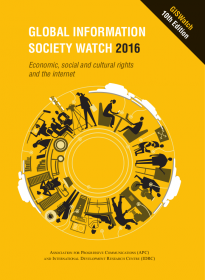Born Digital, Died Young? The Challenges of Cultural Preservation in a Digital Age
08 December 2016
 Digital technologies have allowed for a richer, more diverse production of ideas and expressions than ever before. However, they also bring challenges as regards the preservation of cultural heritage. As part of the Global Information Society Watch (GISWatch) report 2016, focusing on economic, social and cultural rights and the Internet, IFLA has contributed an article setting out the issues from the library perspective.
Digital technologies have allowed for a richer, more diverse production of ideas and expressions than ever before. However, they also bring challenges as regards the preservation of cultural heritage. As part of the Global Information Society Watch (GISWatch) report 2016, focusing on economic, social and cultural rights and the Internet, IFLA has contributed an article setting out the issues from the library perspective.
Preservation is central to the mission of libraries. For commercial publications, once a book or website reaches the end of its economic life, it can seem easier to abandon it than keep it. This is not to mention the many works which are not even produced for commercial ends. In both cases, it often needs to be a third party – often libraries – which intervenes to make sure that information is available into the future.
The importance of this work should not be underestimated. World leaders recognised the need to maintain and give access to cultural heritage in the Sustainable Development Goals, as well as in the WSIS +10 conclusions, which called for the development of practical strategies for the preservation of, and access to, recorded information in all of its forms.
The Digital Difference
There are particular challenges associated with digital heritage. First of all the sheer volume of digital material – how to decide what to preserve? IFLA is involved in the UNESCO PERSIST programme, which offers libraries and cultural heritage institutions a helping hand in setting out strategies.
Secondly, digital materials often have a number of rightholders. While it can already be difficult to identify and contact one person, obtaining agreement from a number of individuals or firms in order to undertake preservation activities can be almost impossible. IFLA is therefore calling for a comprehensive exception to copyright for preservation that allows both for digitisation and work with born-digital materials. It will also be vital to ensure that the creation of digital copies of works does not lead to the creation of new rights.
Finally, there are technical challenges. Whereas it is possible to read a document from 1500 years ago, accessing files held on a floppy disk from 15 years ago is increasingly difficult thanks to rapid technological change. This was notably the case when researchers sought to preserve the archives of Professor Germaine Greer in Australia. Here too, IFLA is working to find ways through UNESCO PERSIST to ensure that it is not just materials, but also the code and software needed to read them, that are kept for future generations.
The work of libraries in preserving our digital cultural heritage, and use of digital tools to maintain and make available other materials, is vital in ensuring a sustainable, long-term information environment. IFLA looks forwards to working with all partners to make this happen.
The whole report is available on the GISWatch website, and was presented at the Internet Governance Forum, with IFLA Deputy Secretary General Stuart Hamilton on the panel of the GISWatch session.